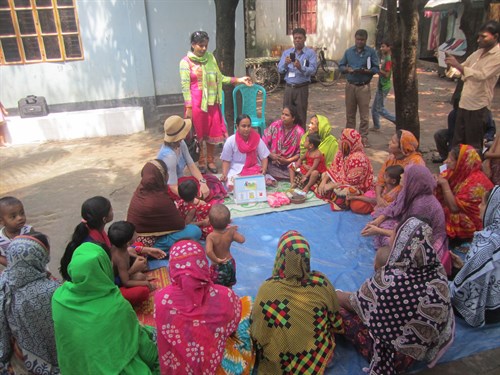
By Daniel Kavoo, Kingsley Chikaphupha, Maryline Mireku, and Patricia Tumbelaka
REACHOUT is a five-year European Commission (EC) research project with the aim of maximising the equity, efficiency and effectiveness of community health service delivery. The eight countries include six implementing countries; two in Asia (Indonesia and Bangladesh) and four in Africa (Kenya, Malawi, Ethiopia, and Mozambique) with the remaining two (UK and Netherlands) providing technical support through the Liverpool School of Tropical Medicine and KIT .
REACHOUT consortium partners,policy makers and practitioners from implementing countries (e.g. Ministries of Health) meet annually in each member country. The broad aims of these meetings are: capacity strengthening, sharing experiences and lessons learnt from each site to improve programme implementation, to review research communication and dissemination plans and outputs and to discuss how these can be best used to impact the community health worker (CHW) landscape.
The James P. Grant (JPG) School of Public Health (of BRAC University) is the implementing partner in Bangladesh. In Bangladesh there is a strong partnership between government and the NGO BRAC due to its national coverage and the wide range of services provided by the NGO such as provision of health and education services, capacity building and micro-finance activities. As part of sharing experiences and lessons participants at our annual meeting undertook a field visit to gain experience of BRAC initiatives and approaches, success and challenges with a specific focus on close-to-community (CTC) providers.
Consequently, we reflected on the differences and similarities between the BRAC programme and those in our own countries:
- Similarities between countries:
CTC providers across the consortium countries conduct home visits to provide services and collect health information. Services include the provision of health promotion messages, treatment of minor ailments, mobilization for uptake of health services, and referral to health facilities. CTC providers also conduct regular meetings with community members to conduct dialogues and discussions according to need and with their supervisors to submit reports. CTC providers are availed with basic health care service provision kits. Health promotion messages in the countries are delivered through visual aids such as flip charts.
- Differences between countries:
While CTC providers generally volunteer without pay, some countries provide them with incentives which recognise their performance which vary in regularity. For instance, in Kenya not all CTC providers receive incentives while in Ethiopia they are salaried workers. Delivery of health education is also different across countries. Some countries deliver need-based health education while others such as Bangladesh have specific modules which guide CTC providers on areas of focus. Participants observed that it was only Bangladesh which has CTC providers involved in primary eye care services. Unlike the other countries tests for bilirubin, blood glucose, and albumin are conducted by CTC providers in Bangladesh. Blood pressure checking is also done by the providers in Bangladesh and Indonesia.
Most of the countries have a well-defined career path for CTC providers where they can progress up the health system hierarchy from one level to the other depending on their performance and education. In some of countries changes in careers entailed on-job training such as six-months training to become skilled birth attendants for the Shasthya Kormis of Bangladesh.
In some contexts CTC providers charge a small fee for service provision, such as in Bangladesh for tests and medicines.
In Bangladesh CTC providers have one register for recording services provided and household information in the community while other countries have different registers for different services and also cadres.
Lessons for REACHOUT
Consortium meetings provide rich opportunities and a conducive environment for member countries to learn and share their experiences and appreciate the similarities and differences across the REACHOUT contexts. The similarities across the countries is an opportunity for the REACHOUT members to influence each other through learning from best practices and contribute to the improvement of community health programme implementation. On the other hand, the differences can be adopted and adapted to the local contexts to ensure practices are in line with country guidelines, standards, and policies.
Watch this space for the next consortium meeting to take place in Kenya, the land of champions, March 2017!!!
Recent news
- Exploring lessons learnt from Close-to-Community Health Worker Programmes: A symposium, 20 June 2016
- How equitable are Community Health Worker programmes?, 31 May 2016
- How relationships shape community health workers’ performance in Ethiopia, Kenya, Malawi and Mozambique, 13 May 2016

This project is funded by the European Union.
